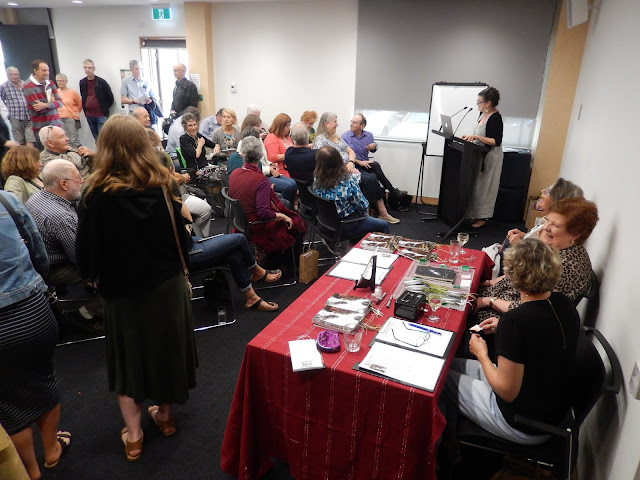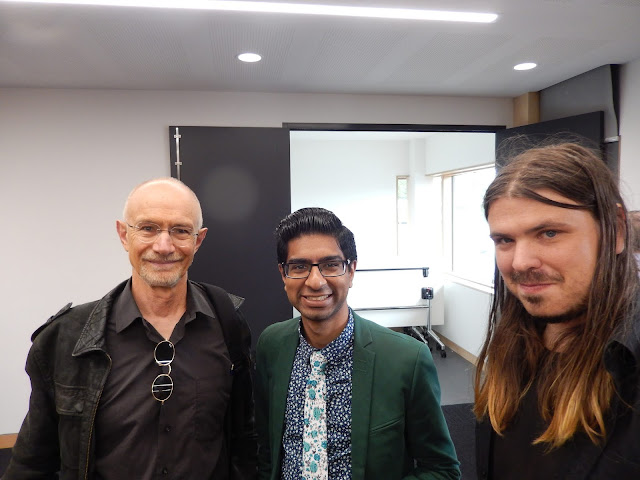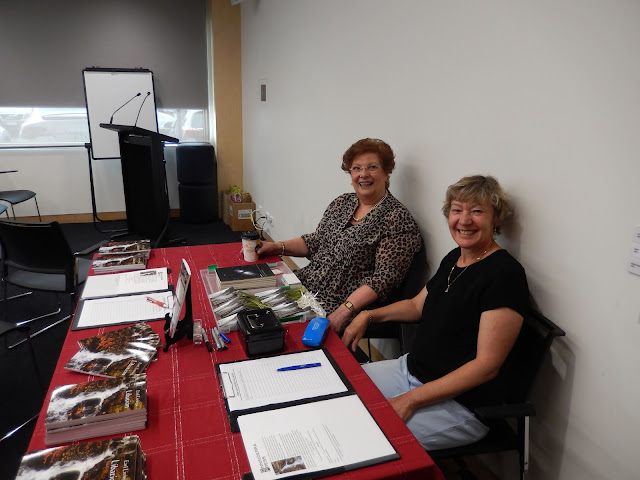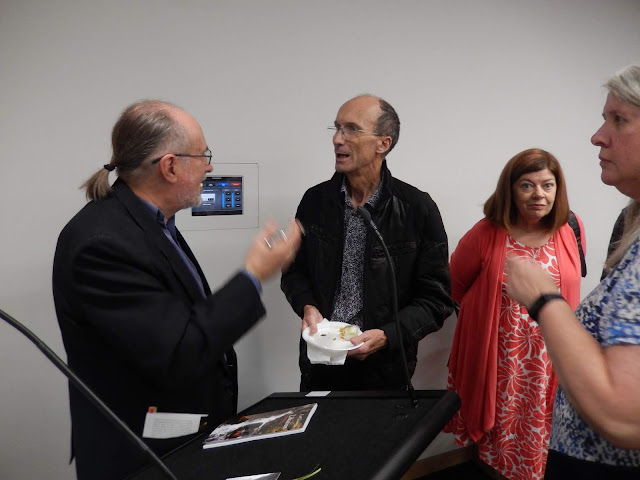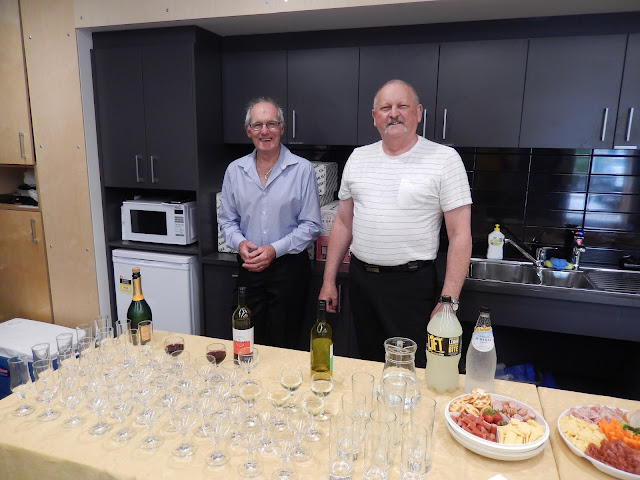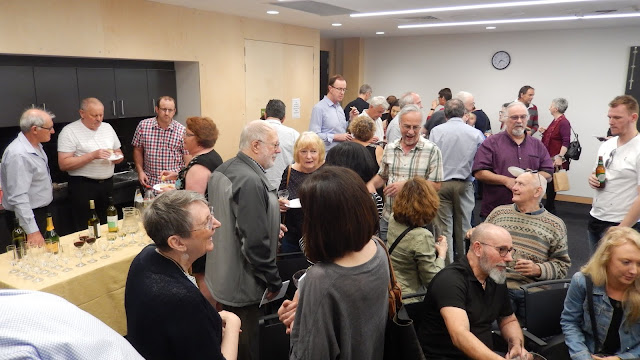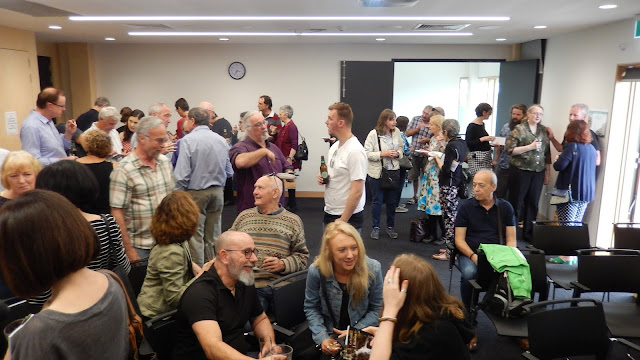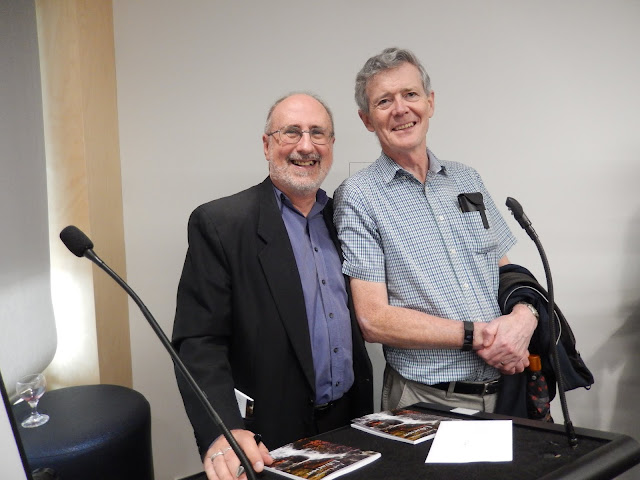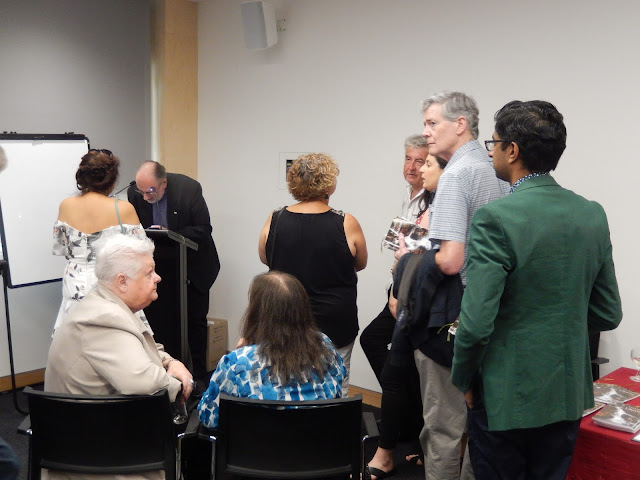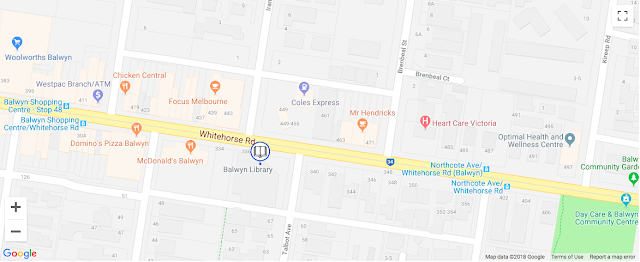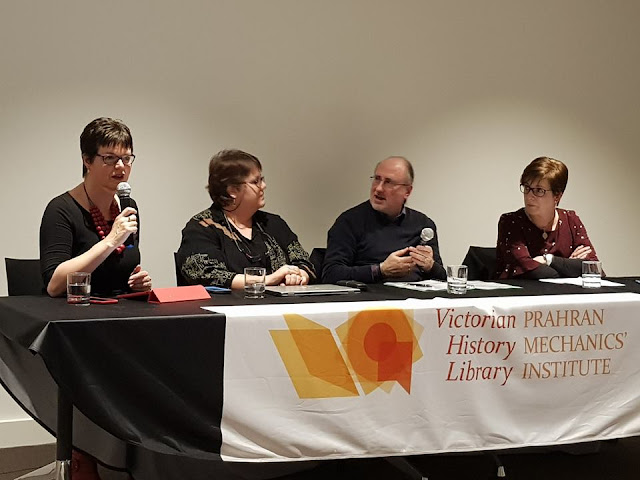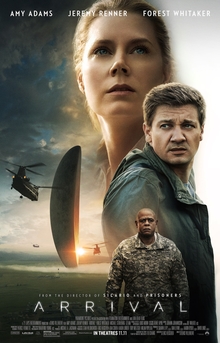Hi Everyone
Saturday, 28 April 2018, saw the running of the inaugural Victorian Speculative Writers Festival (www.specfic.com.au), held at the Gasworks Arts Park in Albert Park. The auditorium was packed (around 120 people) and the sessions themselves were interesting, informative and inspiring. I met up with old friends, made some new ones, and signed books for new readers. The venue itself reminded me of the Malthouse Theatre when it held the Melbourne Writers Festival, a great feeling of intimacy and excitement being a feature of both events (which the MWF has lost in its shift to Federation Square). All in all, Speculate was a fantastic success and the director, Joel Martin, and his team are to be congratulated on their organisational prowess, the range of topics, and the welcoming treatment of panelists and participants.
I appeared as a panelist in the first session: The Once and Future Fantasy, alongside Alison Goodman, Trudi Canavan, and Jay Kristoff, with Joel as moderator. The issues we touched on were Fantasy & You, Fantasy Evolving, Fantasy & Morality and Fantasy Audiences, with thorough contributions by the panel and thoughtful questions from the audience. I even was asked a question about poetry in the speculative field, which was unexpected, yet in keeping with some comments made during the panel discussion. As always, such a session could have gone on for much longer, with deeper and more vigorous discourse, but there were books to be signed and other sessions to attend.
As most of you are aware, I have been doing a series on the interview questions used for the video that opened the festival. This post explains the background to the questions, while the next two posts (here and here) cover the first two:
1. What science fiction/fantasy first made an impression on you?
2. Why do you continue to write science fiction/fantasy?
The third was a three-part question (details below). I delayed writing a post answering this question because I wanted to see what came out of Speculate. So, my answers below will feature some of the notes I made during various sessions.
i. Where do you think science fiction/fantasy is heading?
Other than admitting that the fantasy field has broadened from its Tolkien beginnings in myth to include social issues and other concerns exemplified by Maslow’s Hierarchy of Needs, my panel didn’t really make specific forecasts for the future of the field. However, the science fiction session, with Laura E Goodwin, Dirk Strasser, and Sean McMullen, identified four trends:
1. Climate Fiction (CliFi)
2. New Space Opera
3. Generation Ship Fiction
4. Gender-Focussed Science Fiction
Another issue discussed was the sense that science is advancing so quickly that science fiction can’t keep up. Some solutions offered included jumping far enough ahead that the fiction isn’t compromised by scientific advances for some time and looking at retro-technology: ‘telling us things we don’t know we already can do’ with existing technology.
In regard to speculative fiction film and TV, I must admit I have been disappointed by some recent offerings. Do we really need reboots of old TV shows (Lost in Space) or a Star Trek movie reboot that just becomes an action series with no real exploration of science or culture or a TV version of The Lord of the Rings? And why can’t filmmakers give us something more than ‘colour and movement’, all style but no substance? Why can’t they write decent character arcs and stories without enormous plot-holes and superfluous digressions? (I’m looking at you, The Last Jedi.)
One film I did enjoy on cable not long ago was Arrival (*), especially its depiction of the Sapir-Whorf Hypothesis (the strong version, it seems), but such pickings are few and far between. Where is the thoughtful science fiction of 2001: A Space Odyssey, the dark humour of Dark Star, the ecological interest of Silent Running? While I have been a reader of Spider-Man and other superhero comics on and off since I was a teenager, the glut of superhero movies wears one down and to call them science fiction, as some commentators do, because there is new technology and spaceships and wormholes, shows a distinct lack of genre knowledge. They are fantasy, possibly even modern mythic storytelling, as is the Star Wars franchise, which again is often labelled science fiction.
ii. Where do you hope it would go?
As suggested above, one model I use for story analysis is Maslow’s Hierarchy of Needs, which comprises the following levels: Physiological, Safety, Love/Belonging, Self-Esteem, and Self-Actualisation, plus the recently added Self-Transcendence. Stories, and creative texts in general, help people deal with issues in those regions, either by taking readers and viewers out of themselves for a time, so they forget the world, or into themselves, so they can learn about themselves and the world. They provide those old standbys: Entertainment, Education, and Enlightenment—Action, Thriller, Rom-Com, Rite of Passage, Love Story, Social Commentary, Political Exposure, Biographical, Spiritual, etc., plus all sorts of combinations of these.
Recently, during a discussion with Joel about writing and publishing, we felt there should be another category below Entertainment: Amusement, those shows, incidents, texts, etc. that play on easy references, simple stereotypes, and obvious ‘pratfalls’ to provide a smattering of delight. No need for thought, shallow or deep. No need for self-examination. No need for any sort of sensitivity or sensibility. Bland. Quick. Easily digestible. Easily forgotten and thus requiring constant renewal. The difference between the clever, culturally-analysing-and-defining Entertainment of Seinfeld and the I’m-part-of-the-club, see-how-fashionable-I-am, instant fix Amusement of Gangnam Style and Party Boy Corey.
All this is my way of saying that I would hope our culture shifts away from its constant practice of Amusement (our obsession with celebrity being another example) and moves higher up the spectrum. Sure, Amusement is, well, amusing, in small doses and possibly needed as well, and, obviously, we need grimdark and paranormal regency romance, military SF and modern fairy tales—stories that imaginatively explore survival and connection in the personal, interpersonal, societal realms. But we also need stories that explore the higher reaches of the human condition, that search for Wisdom in ourselves and in the Universe seen and unseen, knowable and unknowable.
iii. Where do you see your contribution to the genre(s) and where do you think that fits, in regards to the direction or as a response to it?
As might be obvious from the above answer, my interests are in those higher reaches. The fantasy verse novel I wrote for my PhD, which my supervisor called a metaphysical epic, delves into issues of spiritual levels of existence. The Silence Inside the World tells the story of a comatose young researcher, an immortal wizard, a dead painter and an unborn soul who all battle a shadow energy creature that threatens the archetypal realm they travel through, a world that may be the source of all possible worlds.
My poetry, both speculative and literary, explores science, nature, myths and the sacred. And my latest prose project, a historical fantasy novel set in the dark ages, examines the dynamic between Myth and History by exploring the life of the historical person who may have been the basis for the Merlin character created by Geoffrey of Monmouth. In other words, I am attempting to write, as Joel once said in a reference to our comic reading activities, the ‘origin story’ of the great and wise magician, counsellor, wonder-worker, mentor. Another dynamic that appears in the story is that between Will (Power), what Tolkien in his ground-breaking essay ‘On Fairy-stories’ calls Magic, and Wonder (Enchantment), what Tolkien terms Faërie.
So, my work could be seen as a response to the current direction of ‘power’ speculative fiction (The Game of Thrones, etc.), though there are precursors, writers like Robert Holdstock, Roger Zelazny and Alan Garner, who have explored the relationship between myth and life, and others, like Tolkien, who have explored Wonder.
For more views on the three questions I have been exploring in this blog series, do have a look at the final video, which was shown at Speculate and is available here. And for those interested in attending Speculate 19, if you haven't already done so, go to the website and put yourself on the mailing list.
I hope you have enjoyed these posts. Given that my new poetry collection, Libation, will be coming out from Ginninderra Press in the second half of the year, I am planning to write some poetry-related posts that I hope will be Entertainment as well as Education.
As always, I welcome your comments.
Best Wishes
Earl
(*) The movie is based on the 1998 short story 'Story of Your Life' by Ted Chiang.
